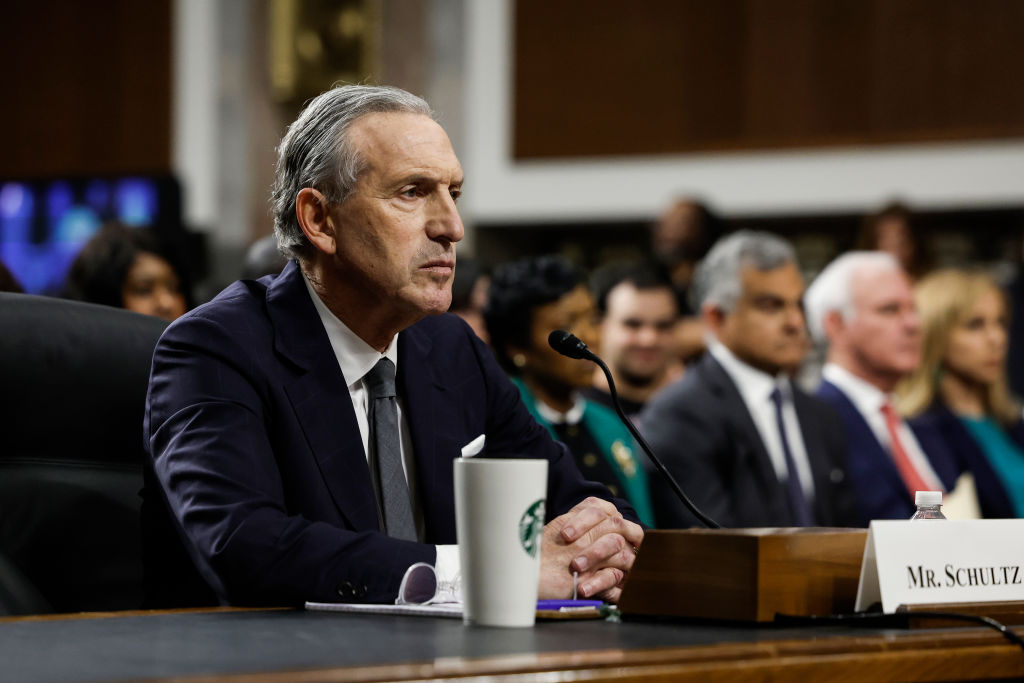
In one of the most contentious moments of a March 29 Senate hearing examining allegations that Starbucks intimidated and fired workers trying to unionize, the shadowy world of well-paid union-busters was thrust into the spotlight.
Sen. Bob Casey (D-Pa.) confronted former Starbucks CEO Howard Schultz over the coffee company’s hiring of Littler Mendelson, the country’s largest employment and labor law firm devoted exclusively to representing management.
“[It’s] one of the largest and most notoriously union-busting firms in the country,” Casey said, noting that the coffee giant can write off as a business expense on its taxes the millions it pays Littler Mendelson to aid Starbucks in its anti-union efforts.
“Taxpayers are subsidizing union busting,” Casey said.
Schultz replied that the company is just adhering to tax laws passed by Congress, adding, “I take offense with you categorizing me or Starbucks as a union buster, which is not true.”
Thousands of Starbucks employees might disagree. The company has required workers around the country to attend mandatory captive audience meetings and allegedly employed “support managers” to monitor workers and dissuade them from joining the union. In addition, workers have complained that a national wage increase and improved sick benefits package announced last May excluded workers in over 50 stores that had voted to unionize. And some union-supporting workers have claimed that their hours were reduced so that they would not qualify for benefits.
“They’re very big on one-on-one meetings and isolating workers to pressure them to go against the union,” says Jaz Brisack, who led workers’ first organizing efforts at a Starbucks store in Buffalo. She also claims that the company monitored social media activity, put undecided workers on shifts with strong anti-union people and that “managers are instructed to find out how people feel about the union” by using a ratings system and reporting back to Starbucks.
As a result, Starbucks Workers United, the group seeking to organize the workers, has filed nearly 500 unfair labor practice motions with the National Labor Relations Board (NLRB) against Starbucks and Littler Mendelson since December 2021, when its unionization campaign began in Buffalo. That far outstrips the number of such motions against any other American company over the same time. The NLRB has determined that the company committed 130 labor law violations during that period. Despite those anti-union efforts, workers at 285 Starbucks stores in 37 states have voted to unionize.
The increasingly tense battle — and the role of Littler Mendelson — highlights the growing role of such union-avoidance consultants, as they prefer to be called. Employers spend an estimated $433 million on payments to these consultants per year, according to a new report by the Economic Policy Institute. Some consultants are paid $350-plus per hour or $2,500-plus per day.
The actual amount that goes to union-avoidance firms is thought to be much greater “because there is not enough data to reveal the true scope of what employers spend,” according to the EPI report. For example, the report includes a list of some major spenders such as Amazon and Hello Fresh, but it does not include Starbucks among them because companies are not required to disclose payments to consultants for advice — “a term that is not defined in the statute and is exploited by many union-busting consulting firms,” notes EPI. Other firms employed by Starbucks are Ogletree Deakins, which trained store managers in Southern states. Recently, the Daily Beast reported that the company was employing at least 50 Littler Mendelson lawyers in 17 states, according to documents filed with the NLRB. In addition, Starbucks paid nearly $11.7 million to its former general counsel Rachel Gonzalez last year, according to SEC filings. And it deploys an army of lobbyists in Washington, D.C. — paying them close to $1.2 million in 2022 — to press lawmakers on a host of concerns, including labor and workplace issues.
According to a report released by the Health, Education, Labor and Pensions Committee this week, “Under Schultz’s leadership, Starbucks has become the most aggressive union-busting company in America.”
Bernie Sanders unloads on Howard Schultz.
‘Over the past 18 months, Starbucks has waged the most aggressive and illegal union-busting camping in the modern history of our country…led by Howard Schultz, the multibillionaire who is with us only under the threat of subpoena.’ pic.twitter.com/OaemiSBqQp
— More Perfect Union (@MorePerfectUS) March 29, 2023
During the Senate hearing, several workers discussed the company’s anti-union activities. Maggie Carter, a barista in Knoxville, Tennessee, said she had to sit through meetings organized by management from local branches to discourage them from joining the union.
Beyond Starbucks, some of America’s biggest companies have spent millions in recent years on union avoidance consultants, many of whom use new technologies such as keystroke-tracking software and keycard tagging to monitor workers, as reported by Capital & Main in 2021.
These are some of the major spenders on union-avoidance consultants in 2021, according to an analysis cited in the EPI report:
Such well-funded campaigns to stifle organizing activity are not dissuading Theresa, a barista at a Starbucks in midtown Manhattan. “We’re going to do what it takes to stand up for our rights.”







